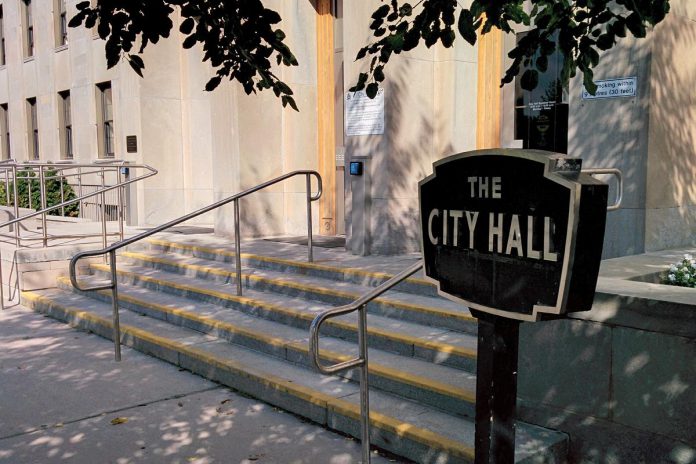Peterborough city council will be considering a proposed new program that would allow the City of Peterborough to expropriate land in the central area of the city on behalf of private developers for housing projects.
The proposal will come before council on Monday evening (January 27) at its general committee meeting, which will also serve as a public meeting on the proposal as per requirements of the Planning Act.
A report from Blair Nelson, the city’s commissioner of infrastructure, planning and growth management, proposes amending the city’s central area community improvement plan to add the “Strategic Land Acquisition and Conveyance Program,” while also expanding the existing central area community improvement plan area to conform with the expanded central area in the city’s new official plan.
The Strategic Land Acquisition and Conveyance Program would mean the city could forcibly acquire land from a property owner, “conveying it to a third-party for the purpose of carrying out development and redevelopment” according to the report.
For example, if a private developer had already acquired a substantial number of contiguous properties for a housing development but was unable to convince a remaining property owner to sell a desired property, the developer could apply to the program to have the city expropriate that property and sell it to the developer.
“Acquiring the land needed for redevelopment can be a challenging, costly and time-consuming endeavor,” reads the report. “Failure to assemble an appropriately sized and configured land assembly can lead to less-than-optimal development proposals, failure of certain projects to come to fruition, delay in the provision of much needed housing supply, continuation or exacerbation of land use conflicts and ultimately an inability to meet the vision outlined for the City’s Central Area as depicted in the Official Plan.”
The report states that the intention of the program is so the city “can strategically acquire properties that could be key components of private redevelopment projects” when the private developer has had difficulty acquiring the properties.
PDF: City of Peterborough Central Area Community Project Area
City of Peterborough Central Area Community Project AreaThere are three pieces of provincial legislation — the Planning Act, the Municipal Act, and the Expropriations Act — that give the city the power to acquire land in this manner.
Section 28(1) of the Planning Act allows a municipality to designate a “community improvement project area,” which it defines as “a municipality or an area within a municipality, the community improvement of which in the opinion of the council is desirable because of age, dilapidation, overcrowding, faulty arrangement, unsuitability of buildings or for any other environmental, social or community economic development reason.”
In 2011, the City of Peterborough adopted a community improvement plan for its central area. Under the same section of the Planning Act, when a municipality’s official plan designates a community improvement project area, the municipality is allowed to acquire land within that area.
To encourage development and redevelopment in the central area, the city’s community improvement plan has included several incentive programs based on tax increments and grants that have evolved over time.
Although Section 106(1) of the Municipal Act normally prohibits municipalities from the “granting of bonuses” to commercial enterprises — including by lending money, selling properties below fair market value, or exempting developers from fees or levies — an exemption to this prohibition is granted in the Planning Act for community improvement plans.
While the Strategic Land Acquisition and Conveyance Program does not involve the city providing financial incentives for developers, it would leverage the city’s powers under provincial legislation to expropriate land for the benefit of a developer.
“This proposed new program is different and would enable the City to become directly involved by using expropriation powers under the Municipal Act to acquire and convey land to a developer who has demonstrated its development will meet key goals and deliverables as set out in the program and helps to achieve the overall vision of the (Community Improvement Plan for its Central Area) and Official Plan for the Central Area,” reads the report.
Although the Municipal Act does give municipalities the power to expropriate privately owned land through the provincial Expropriations Act, municipalities have traditionally only done so when the land is required for public use, such as for public utilities, infrastructure, or highway development.
However, there have been situations where Ontario municipalities have expropriated land for the use of private commercial interests.
In the late 1990s, the City of Toronto expropriated 10 properties at the intersection of Yonge and Dundas streets and sold the assembled land to a private developer. In the early 2000s, the County of Oxford expropriated a parcel of commercial land so that Toyota Canada could build a manufacturing plant in Woodstock near London.
More recently, the Region of Waterloo — with funding support from the Ontario government — has been attempting to expropriate 770 acres of farmland in Wilmot Township to create serviced land for future industrial projects.
As for the City of Peterborough’s proposed Strategic Land Acquisition and Conveyance Program, the report states it would be “net neutral” to the city’s budget, with all costs associated with expropriating land to be recouped from the developer.
“Use of this program would be an exceptional last resort for a developer because the cost of acquiring property through expropriation is high and staff-time intensive,” the report reads. “The rationalization for expropriating land must demonstrate a strong financial and logistical benefit to the community.”
Applications to use the program would have conditions, including that the developer has demonstrated “considerable effort” to acquire the desired property on its own, the developer already owns “a significant majority” (60 per cent or more) of the land proposed for development, and that the developer’s acquisition of the additional land would “directly result in a more suitable development” (such as a regularly shaped building lot).
“The proposed development must demonstrate that acquisition of the additional land will result in a significant increase in the number of dwelling units to be provided compared to a development that excludes the said lands,” the report adds.
All applications under the Strategic Land Acquisition and Conveyance Program would be approved by council. The process for land use approvals, including zoning by-law amendments and site plan approvals, would also be followed.



























